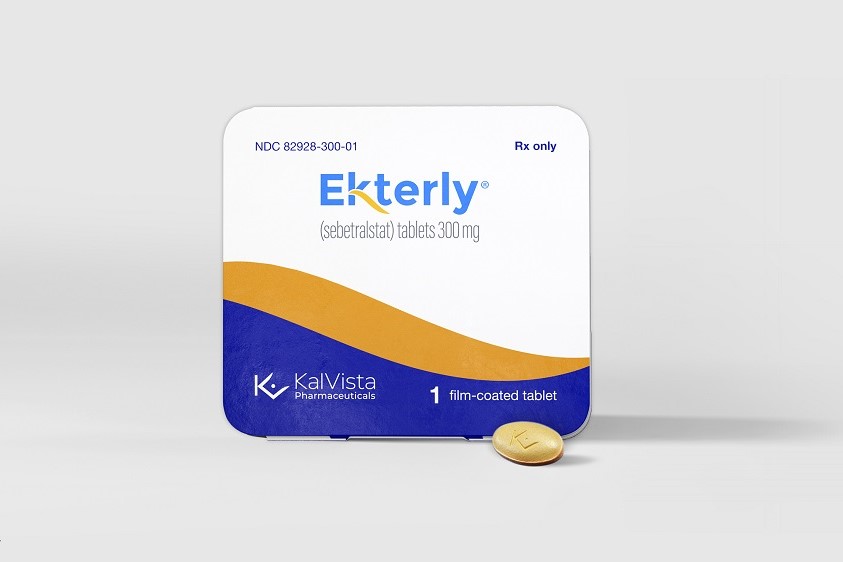
In the rare disease hereditary angioedema, or HAE, painful swelling attacks can happen anywhere in the body without warning. Drugs are available for acute treatment of these attacks, but they’re all administered by injections or infusions — burdensome dosing methods, particularly for younger patients. The FDA has approved a KalVista Pharmaceuticals pill, making it the first oral therapy for treating acute attacks caused by HAE.
The regulatory decision announced Monday covers use of the drug by patients age 12 and older. Known in development as sebetralstat, the pill will be marketed under the brand name Ekterly. The approval comes three weeks later than expected. Last month, Cambridge, Massachusetts-based KalVista disclosed that the FDA would not meet that deadline due to “FDA resource constraints.” The company said its new product, the biotech’s first, will launch immediately.
“For the first time, patients have access to an oral on-demand treatment that provides the opportunity to change how and when attacks are treated,” KalVista CEO Ben Palleiko said, speaking during a Monday morning conference call.
HAE is an inherited disorder stemming from a genetic deficiency or dysfunction of C1 esterase inhibitor, a protein that controls other proteins associated with swelling and inflammation. Lacking C1 esterase inhibitor leads to uncontrollable activation of the kallikrein-kinin system, which in turn leads to the swelling attacks characteristic of HAE. These attacks can happen throughout the body. They can become life threatening when they affect a patient’s face and airway.
Drugs currently available for treating acute HAE attacks include two C1 esterase inhibitors, Ruconest from Pharming Group and Berinert from CSL Behring. Takeda Pharmaceutical markets a kallikrein inhibitor, Kalbitor, and a bradykinin inhibitor, Firazyr, both for acute treatment of HAE attacks. All of these drugs are administered via needles. BioCryst Pharmaceuticals markets a once-daily oral inhibitor of kallikrein, a protein that plays a role in HAE swelling attacks. The BioCryst drug, Orladeyo, is approved only for prevention of HAE attacks in patients age 12 and older.
KalVista’s Ekterly is an oral small molecule kallikrein inhibitor. In the Phase 3 test that supported Ekterly’s FDA submission, results showed the drug was faster in achieving symptom relief, reduction in attack severity, and attack resolution compared to a placebo. In an open-label extension study, Ekterly enabled patients to treat their acute HAE attacks in a median of 10 minutes following attack onset. These latest results show symptom relief occurring in a median of 1.3 hours for attacks involving the larynx and abdomen as well as for breakthrough attacks in patients who were receiving long-term HAE prophylactic therapy. The most common adverse reaction reported in clinical testing was a headache.
Ekterly’s prescribing information directs patients to take one dose, consisting of two tablets, at the first sign of an HAE attack. A second two-tablet dose may be taken three hours after the first one, if the initial dose was inadequate or if symptoms return or worsen. KalVista will make Ekterly available in packages containing two doses, or four tablets total. KalVista set a wholesale price of $16,720 per dose, which means a single package costs $33,440. By comparison, other branded products available for acute HAE treatment cost between $11,000 to $17,000 per dose.

What Are Healthcare Organizations Getting Wrong about Email Security?
A new report by Paubox calls for healthcare IT leaders to dispose of outdated assumptions about email security and address the challenges of evolving cybersecurity threats.
“We’ve priced Ekterly competitive to existing branded therapies in the HAE market,” Chief Commercial Officer Nicole Sweeney said. “We believe this pricing reflects the innovation we’re bringing to the community and will support broad utilization.”
In a note sent to investors, Leerink Partners analyst Joseph Schwartz said Ekterly’s clean label opens the product up to address a broad population of HAE patients.
“With the potential to treat an attack with a pill, which has long been the holy grail in HAE, we see the approval of Ekterly as paradigm shifting for the landscape,” Schwartz said. “Ekterly offers injectable-like efficacy, while the convenient oral route of administration should allow for earlier treatment and the treatment of all HAE attacks.”
Ekterly is still under regulatory review in Europe and Japan. Leerink projects the drug will achieve about $470 million in peak sales in the U.S. and Europe for acute HAE treatment. The drug could find additional uses treating diseases that benefit from kallikrein inhibition. It could also expand its current label in HAE. KalVista has a pivotal study underway evaluating an orally disintegrating tablet formulation of Ekterly for treating HAE attacks in patients age 2 to 11.
Competition to Ekterly could be coming from Pharvaris, which is in pivotal testing with deucrictibant, a bradykinin B2 receptor antagonist formulated as a once-daily capsule. Pharvaris has two Phase 3 tests underway, one for acute HAE treatment and the other for HAE prophylaxis. The Netherlands-based company has said that deucrictibant’s extended-release formulation enables its drug to maintain therapeutic exposure in the body for more than 24 hours, offering the potential for a high rate of resolution of HAE attacks with a single dose.
Photo by KalVista Pharmaceuticals








